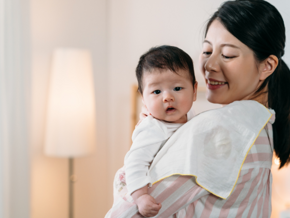
Baby Vaccinations and Immunisation Schedule
Fortunately parents do not have daily reminders of the chronic debilitation and deaths caused by diseases such as whooping cough, polio, measles and diphtheria. So as a parent, you may question whether there is a need to immunise your child.
The passive immunity your baby received while developing in the womb progressively declines from birth. Immunoglobulin G (an antibody) passes through the placenta – at birth reaching a level equal to that of the baby’s mother and then gradually disappearing in the weeks and month after birth. After this time, your baby’s immune system is immature and requires added help to fight off serious childhood disease, and this is why immunisations are so important.
Vaccines work by introducing a dead or weakened form of a specific virus or bacterium to the immune system. The body then produces antibodies to fight future invaders of the disease often before your baby show signs of being sick.
The most common side effects of immunisations include pain, redness, heat and swelling at the injection site. Your baby may get a temperature or have muscle aches and pains for 24 to 48 hours. These symptoms may cause unsettled behaviour and poor sleep for a day or two. Rarely do more serious immediate or ongoing side effects occur but like any drug there is always the risk. Wait around the surgery for a while after an immunisation just in case.
Help your baby feel more comfortable by giving extra breastfeeds and fluids or sucking on a dummy. Keep them comfortable with tepid baths if they have a fever or place a tepid wet washer on the injection site. Your baby may not want to move their leg or arm for a day or two but as the pain and stiffness subsides movement will improve. Give your baby a suitable anti-inflammatory medication such as Ibuprofen or an analgesic such as paracetamol if they are extremely miserable and contact your health care professional if you are worried.
You may come across parents who are against immunisations due to the potential side effects. While this is a personal choice, it is important to be aware of the consequences of not immunising your child. By not immunising, communities have a greater risk of seeing epidemics of childhood disease return. This increases the risk of your baby suffering the adverse complications of these diseases which far out way the possible side effects of vaccines.
Vaccines are constantly monitored, thoroughly tested and evaluated for their safety. Contact your community nurse or doctor for the recommended immunisation schedule for your little one, or to discuss any concerns you may have.


















